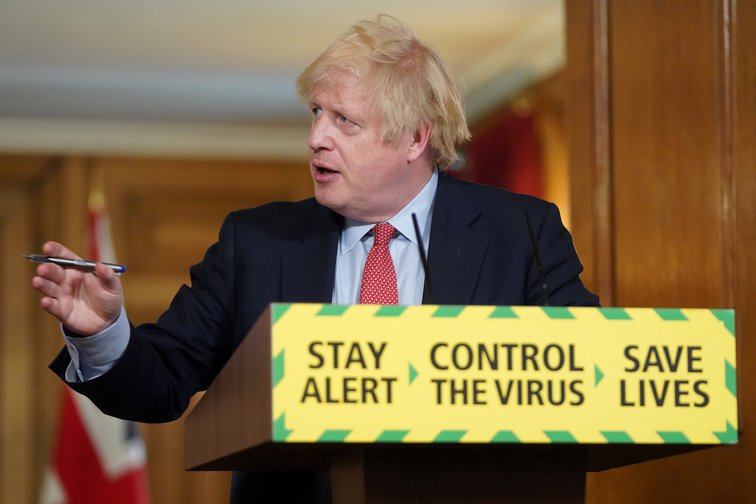
Number 10 must lift briefing ban on openDemocracy, says European press freedom watchdog
Government accused of attempting to “isolate and punish critical coverage” by boycotting media outlets.
by Adam BychawskiSeveral prominent international organisations monitoring press freedom have written to the Prime Minister Boris Johnson asking him to overturn the ban on openDemocracy and other media outlets from press briefings.
Earlier this week, the government was condemned for using “tactics deployed by repressive regimes” after openDemocracy revealed it was barred from asking direct questions at Number 10’s televised daily briefing on the orders of Johnson and his senior advisor Dominic Cummings.
The letter from the Media Freedom Rapid Response (MFRR), which is signed by organisations including European Centre for Press and Media Freedom (ECPMF), Article 19 and the European Federation of Journalists, criticises the government for its attempts to “restrict media scrutiny of its policies and discredit critical reporting”.
Over the weekend, the government sought to dismiss reports about Cummings flouting lockdown rules by saying that they came from “campaigning newspapers”. The same language was used to justify openDemocracy’s exclusion from Number 10’s COVID-19 press briefings.
The letter accuses the government of attempting to “isolate and punish critical coverage”. In recent months, Number 10 has refused to put forward ministers or representatives to be interviewed on a host of news programmes including BBC Radio 4’s Today Show and ITV’s Good Morning Britain.
In February, Lee Cain, the prime minister’s head of communication, told reporters that “we are welcome to brief whoever we like, whenever we like” after Number 10 was criticised for inviting only selected journalists to a press briefing.
After the Sunday Times published a report last month revealing that the prime minister missed five Cobra meetings on the coronavirus in the lead up to the outbreak, the paper was reportedly banned from asking questions at Number 10’s daily press briefing.
The ECPMF warns that the government's refusal to engage with media outlets amid the pandemic could risk a “public information crisis” by preventing the press from informing the public.
The intervention from the leading European press freedom watchdog comes after a raft of national and international organisations criticised the government for its treatment of journalists on Wednesday.
Reporters Without Borders warned that Downing Street’s “vindictive” response to media criticism of its handling of the pandemic meant press freedom in the UK was being eroded.
While English PEN, a branch of the international association of writers, said Boris Johnson’s government was intentionally discrediting openDemocracy and other news outlets.
And International Media Support (IMS), headquartered in Denmark, told openDemocracy that “worse was to come unless these early warnings about the erosion of press freedom in the UK are confronted and reversed”.
This week, the Society of Editors, whose 400 members campaign for the right to freedom of expression in the UK news media, wrote to the prime minister to raise concerns about the language used to dismiss damaging news stories about Cummings.
Ian Murray, the society’s executive director, said he asked for reassurances that the deployment of the phrase “campaigning” to describe media outlets is not part of a wider campaign.
On Wednesday, BBC Newsnight host Emily Maitlis chose not to appear on the programme after her monologue criticising the government’s defence of Cummings prompted fury among some Conservative MPs.
In her opening remarks on Tuesday’s show, Maitlis said Cummings had “broken the rules” and “the country can see that, and it’s shocked the Government cannot”.
Following the broadcast, the BBC issued a statement saying that the presenter’s comments breached impartiality rules.
However, the judgement came under fire from several journalists and politicians.
Keith Brown, SNP deputy leader, said the statement was a “gutless capitulation”. While the National Union of Journalists’s general secretary Michelle Stanistreet said that journalists “should certainly not be castigated” for holding the government to account.
Stop the secrecy: Publish the NHS COVID data deals
To: Matt Hancock, Secretary of State for Health and Social Care
We’re calling on you to immediately release details of the secret NHS data deals struck with private companies, to deliver the NHS COVID-19 datastore.
We, the public, deserve to know exactly how our personal information has been traded in this ‘unprecedented’ deal with US tech giants like Google, and firms linked to Donald Trump (Palantir) and Vote Leave (Faculty AI).
The COVID-19 datastore will hold private, personal information about every single one of us who relies on the NHS. We don’t want our personal data falling into the wrong hands.
And we don’t want private companies – many with poor reputations for protecting privacy – using it for their own commercial purposes, or to undermine the NHS.
The datastore could be an important tool in tackling the pandemic. But for it to be a success, the public has to be able to trust it.
Today, we urgently call on you to publish all the data-sharing agreements, data-impact assessments, and details of how the private companies stand to profit from their involvement.
The NHS is a precious public institution. Any involvement from private companies should be open to public scrutiny and debate. We need more transparency during this pandemic – not less.
By adding my name to this campaign, I authorise openDemocracy and Foxglove to keep me updated about their important work.